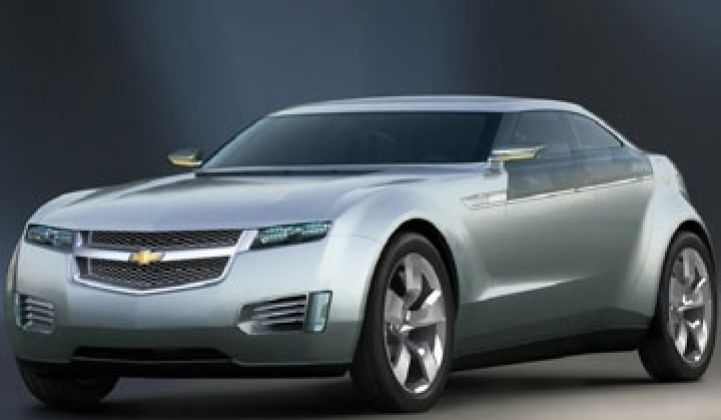General Motors said Tuesday that its upcoming plug-in hybrid Chevy Volt will be able to get an impressive 230 miles per gallon in city driving – a claim that revived ongoing concerns about the sometimes questionable methods used to calculate gas mileage for plug-in hybrid vehicles.
The 230 miles-per-gallon rating could be achieved under a draft Environmental Protection Agency fuel economy methodology for plug-in hybrids, GM announced Tuesday. That methodology would use kilowatt-hours per 100 miles driven as a benchmark, and GM expects the Volt to use as little as 25 kilowatt-hours per 100 miles driven
The Volt is expected to run about 40 miles on its electric motor. That's about how far eight in 10 Americans drive in a typical day, according to U.S. Department of Transportation data.
The Volt would then extend that range using a gasoline-powered engine to charge its battery – a different technology than what is used in Toyota's Prius hybrid, which uses both its the gasoline engine and its electric motor to move the car forward.
But the methods used to calculate gas mileage for different types of plug-in hybrids is a matter of much contention. For example, Google claimed that a test of converted plug-in hybrid Toyota Priuses showed the cars could get 93.5 miles per gallon on average, or 115 miles per gallon for city driving.
The test was achieved using professional drivers, driving the cars on mostly flat roadways in mild weather, starting with a fully charged battery pack. A Department of Energy test of plug-in hybrid vehicle demonstrations showed that more typical driving patterns could yield mileages about half those achieved in more controlled testing (see Are the Benefits of Plug-In Hybrids Overstated?).
GM's mileage claim for the Volt was seen as a move to differentiate it from competitor Toyota, which holds the hybrid market lead with its Prius and plans to release a plug-in Prius in 2012 (see Toyota to Mass-Produce Plug-In Prius in 2012).
The 2010 Prius can get 51 miles per gallon in city driving and 48 miles per gallon in highway driving, the EPA has said. Companies that offer covert kits, such as Hymotion (owned by battery maker A123 Systems) and Hybrid Plus, often tout their plug-in hybrids as being able to achieve more than 100 miles per gallon.
But the current Prius sells for a starting price of $22,000, whereas GM Vice Chairman Bob Lutz has said the Volt will probably cost $40,00 when it goes on sale in November 2010 (see Bloomberg article).
GM's claim, "If it can be validated, then I think it's a win on all levels," said Thilo Koslowski, lead automotive analyst for Gartner. "Four times better than the fuel efficiency of a [non plug-in] Prius is nothing to sneeze at."
But much will depend on how EPA sets its methodology for measuring the mileage of plug-in hybrid vehicles, he added.
Toyota has not yet released miles-per-gallon figures for its upcoming plug-in Prius, he added.
As for the Chevy Volt, much will depend on whether GM can deliver the car by its self-imposed 2010 deadline, he added. GM warned in a regulatory filing last week that the Volt's technology "has not yet proven to be commercially viable" and may not be ready for the 2010 deadline, Bloomberg reported.
The Volt is certainly seen as a critical product for the automaker, which is now majority-owned by the federal government since it emerged from bankruptcy (see Will GM Abandon Hydrogen Cars?)



